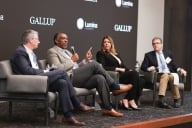You have /5 articles left.
Sign up for a free account or log in.
Baseball playoffs are here, and while I don’t watch it anymore (RIP Expos) except to see who wins the World Series, I still think a lot in terms of the different roles that players have within the dynamic of the team. The utility player, particularly in baseball, is someone who is essential to the success of a team, but often goes unsung within the popular mythos of a team’s success. We love a superstar, but only the stats hounds love the guy who can fill a whole when the superstar gets injured or needs a night off.
When I swam competitively, I was really good at two events, the 100m and 200m backstroke. I was the team’s backstroker; I did it on the relay, and I was our top racer in the two events. When it came time for team championships, where our team scores were totaled, I always swam backstroke. We also had another girl who swam a killer butterfly, more than enough girls who could swim a fast breastroke, and more freestylers than we knew what to do with, especially at the shorter distances. We were each allowed to swim five events and two relays. So, I ended up swimming the 400 and 800 free, along with the 400 IM. I swam the events no one else wanted to swim. Turned out, I was pretty decent at the distance freestyle events, and I even enjoyed them more than the shorter, sprint events.
But I will never, ever, EVER enjoy the 400 IM. I can’t swim breastroke. At all. Never have. And I tried. One year, I was determined to improve my breastroke and wrecked both my knees in the process. But as a result of my inability to swim the stroke, the breastroke leg of my 400 IM was possibly the most comically slow swimming you would ever see at a swim meet of that caliber. It was a running gag, where my teammates would all scream their heads off with every pull, as I slowly dragged myself from one end of the pool to the other. I would watch as all the other swimmers pulled ahead me. Because of my distance training, I could always catch a few of them on the final freestyle leg of the race, and while I never won, I always, always scored points. I also knew that a number of other swimmers on the team started swimming events they didn’t like but knew they could score in because I always, always swam all the worst events, and that I would be there at the end of the pool cheering them on as they did. The year we won team champs, it didn’t matter how much I hated swimming that event, I knew that my willingness to swim the 400 IM for a small handful of points had made a difference. I was our swim team’s utility player.
In my new job, I am fulfilling the roll of a utility player. While I have been brought in for my specialization in digital pedagogy, there aren’t many large-scale projects for me to work on between workshops (except it’s nice that making games and experimenting on ello actually count as part of my job). So, I pitch in wherever I can, especially if it involves writing. I’ve started a low-level weekly newsletter for our administrative overseers to give them a clearer idea of what we do. I do research for others in the Center who are doing consultations in areas they aren’t as familiar with. I facilitate groups, I fill holes, I sit in on meetings, I connect people…And I do it well.
I’ve written about my versatility before, but in a way that focused on my identity as a “scholar” in a traditional sense. Now, I’m working in an environment where I have a number of skills that I can deploy when needed, and I am also flexible enough to learn new skills or take on new challenges when called upon. In fact, I gladly volunteer for them. I might never be the superstar, but I feel like my contribution to this team is important because I’m willing and able to play the role of the utility player.
This, of course, is a role that is typically denigrated in traditional academia. It’s called “adjuct” – the person who can cover just about any class at a moment’s notice. And you learn to very quickly get up to speed on a given topic in order to be able to teach it effectively. Of course, this means that there is little time for your own research and specialization, let alone publishing. And then, inevitable, you are no longer a shiny, new PhD but a stale adjunct. “Experience” be damned.
I like my baseball analogy. For the utility player, often experience is necessary, to accept, understand, and maneuver the various roles you will be asked to play. Experience, in baseball, can also often be called “leadership” – the willingness to work, to sit on the bench, to fulfill roles, to lead by example. There are different ways to lead and excel. I’m pretty happy that I’ve found my baseball team.





